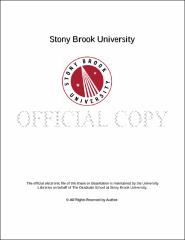| dc.identifier.uri | http://hdl.handle.net/11401/77535 | |
| dc.description.sponsorship | This work is sponsored by the Stony Brook University Graduate School in compliance with the requirements for completion of degree. | en_US |
| dc.format | Monograph | |
| dc.format.medium | Electronic Resource | en_US |
| dc.language.iso | en_US | |
| dc.publisher | The Graduate School, Stony Brook University: Stony Brook, NY. | |
| dc.type | Dissertation | |
| dcterms.abstract | This dissertation argues that the form and context of the modernist novel allows for the representation of a wide range of cognitive and neurological differences. Building on Patrick McDonagh’s work “Autism and Modernism,†my dissertation elucidates how the formal elements of the modernist novel—criticized by Georg Lukács for its potential to put readers in the mind of the mentally ill—paved the way for the conception of cognitive differences like autism since they demonstrated the isolating effects of deficits/differences in the individual’s conception of time, sensory experience, mind reading and language. While the works under study do not present a homogenous attitude towards disability—they collectively present a spectrum of ability levels and often conflicted attitudes towards cognitive difference—they all prominently feature autistic characters and deem judgments regarding cognitive normality as inherently problematic. Furthermore, physical and neurological difference is often figured as inherently valuable—in terms of testing the aesthetic possibilities of the novel and in critiquing society’s standardized conceptions of normality as it relates to such varied concepts as gender, sexuality and behavior—in these novels. While these works occasionally demonstrate a concern with the biological influences and primitivism of the “other†in a cosmopolitan society, I argue that these texts demonstrate as much of an interest in intellectual disability and deviance as a product of the racial and intellectual mainstream as they do racialized difference. These works, then, suggest an aesthetic and philosophical commitment to cognitive variance and deviance, as well as an anxiety regarding the changing nature of human experience and the individual’s ability to adapt to a modern world. This project presents an important counter-point to critical perspectives that view modernist writers and novels as presenting homogenous attitudes towards cognitive difference and pathology. | |
| dcterms.available | 2017-09-20T16:52:52Z | |
| dcterms.contributor | Marshik, Celia J | en_US |
| dcterms.contributor | Dunn, Patricia | en_US |
| dcterms.contributor | Rubenstein, Michael | en_US |
| dcterms.contributor | Robinson, David. | en_US |
| dcterms.creator | Dotterman, Anthony Matthew | |
| dcterms.dateAccepted | 2017-09-20T16:52:52Z | |
| dcterms.dateSubmitted | 2017-09-20T16:52:52Z | |
| dcterms.description | Department of English. | en_US |
| dcterms.extent | 268 pg. | en_US |
| dcterms.format | Monograph | |
| dcterms.format | Application/PDF | en_US |
| dcterms.identifier | http://hdl.handle.net/11401/77535 | |
| dcterms.issued | 2015-05-01 | |
| dcterms.language | en_US | |
| dcterms.provenance | Made available in DSpace on 2017-09-20T16:52:52Z (GMT). No. of bitstreams: 1
Dotterman_grad.sunysb_0771E_12423.pdf: 1785841 bytes, checksum: 7cbe41fcd835cf1c4eadd0346680f0c6 (MD5)
Previous issue date: 2015 | en |
| dcterms.publisher | The Graduate School, Stony Brook University: Stony Brook, NY. | |
| dcterms.subject | autism, Beckett, Conrad, Faulkner, Modernism, Woolf | |
| dcterms.subject | Literature | |
| dcterms.title | Neurodiverse Modernism: Cognitive Disability and Autism in the Works of Virginia Woolf, William Faulkner, Joseph Conrad and Samuel Beckett | |
| dcterms.type | Dissertation | |

